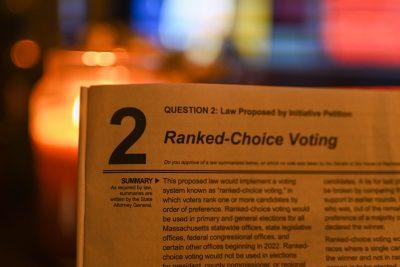The Massachusetts Republican State Committee voted unanimously to oppose ranked-choice voting in a committee resolution last week, citing voter disenfranchisement and election-rigging concerns.

Ballot Question 2 will ask voters in November if the state should switch to a ranked-choice voting system. If the proposal passes, Massachusetts would use ranked-choice voting in state and federal elections, except in presidential, county commissioner and regional district school committee member races.
The system would allow voters to rank the candidates on a number scale rather than select one absolute choice. MassGOP’s resolution states:
“Ranked Choice Voting is an unnecessarily confusing voting system that has been shown to result in a disproportionate number of ‘spoiled’ ballots cast by the less educated, those for whom English is not their first language and people of color.”
Confusing voters is a form of voter disenfranchisement, said Paul Craney, a board member for the Massachusetts Fiscal Alliance, which advocates for fiscal responsibility.
“Voter exhaustion disenfranchises voters in ranked-choice voting,” Craney said. “That’s not a debate. That’s a fact.
Craney said voters would face confusion about how the new ballot works.
Evan Falchuk, who ran for Massachusetts governor in 2014 as an independent, is chair of the Ranked Choice Voting 2020 Committee. He said voters would understand ranked-choice voting because they rank objects and choices every day.
In Maine, a state that voted in favor of ranked-choice voting in 2016, nearly three-quarters of voters found the ballot easy to use, according to a 2018 exit poll funded by electoral reform advocacy group FairVote.
The benefits of ranked-choice voting are found, Falchuk said, in the expanded choices that voters have.
“We hear a lot from voters that they feel like they have to hold their nose and vote for the lesser of two evils,” Falchuk said. “One thing ranked-choice voting does is it levels the playing field.”
This system also gives third-party candidates a better chance, Falchuck said, by eliminating the need for electability-focused politics.
“If you’re knocking on doors and there was a sign for another candidate outside the house, you wouldn’t knock on that door,” Falchuck said. “In a ranked-choice selection … they could consider you as their second choice.”
The MassGOP’s resolution also states ranked-choice voting “raises the potential for rigging and gaming elections.”
Complex voting systems are easier to manipulate, according to Boston College political science professor Dennis Hale.
While voter fraud is most commonly a matter of tampering with the collection of ballots, Boston College political science professor David Hopkins said ranked-choice voting is more likely to cause disenfranchisement.
“It’s no different from any other ballot process or voting process. It’s simply about the nature of how you express your preferences on the ballot,” Hopkins said. “Most elections won’t turn out any different.”
Craney said two-round runoff voting may work better than ranked-choice voting. In this system, voters chose in the second round between the two candidates with the most first-round votes if no candidate won the majority in the first round.
Regardless of party affiliation, Falchuk said voters ultimately benefit most from ranked-choice voting.
“You’re always going to get more choices,” Falchuk said. “Your voice is always heard, and your vote is never wasted.”





















































































































